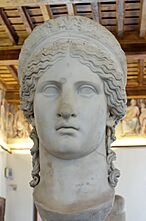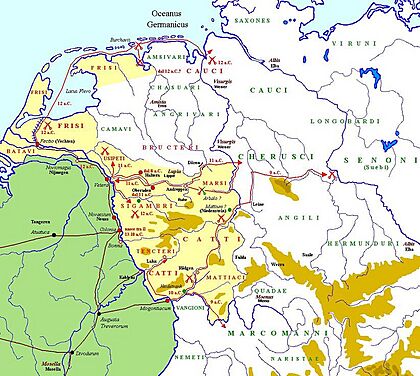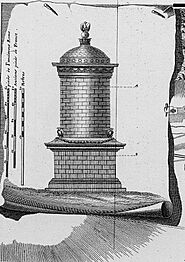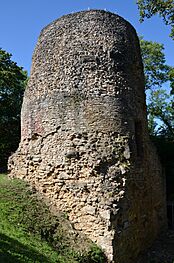Nero Claudius Drusus facts for kids
Quick facts for kids Nero Claudius Drusus |
|||||
|---|---|---|---|---|---|
| Consul | |||||
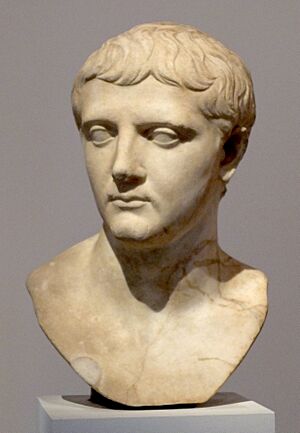
Bust of Nero Claudius Drusus, in the Capitoline Museums, Rome
|
|||||
| Born | Decimus Claudius Drusus or Decimus Claudius Nero 14 January 38 BC Rome, Italy, Roman Republic |
||||
| Died | 9 BC (aged 29) Magna Germania |
||||
| Burial | Mausoleum of Augustus | ||||
| Spouse | Antonia the Younger | ||||
| Issue Detail |
|
||||
|
|||||
| Dynasty | Julio-Claudian | ||||
| Father | Tiberius Claudius Nero | ||||
| Mother | Livia Drusilla | ||||
Nero Claudius Drusus Germanicus (born in 38 BC, died in 9 BC), often called Drusus the Elder, was an important Roman general and politician. He belonged to a noble Roman family called the patrician Claudians. His mother was Livia Drusilla, who later married the Emperor Augustus, making Drusus Augustus's stepson.
Drusus was also the brother of the future Emperor Tiberius. He was the father of two famous Romans: Germanicus, a great general, and Claudius, who later became Emperor. This means Drusus was the grandfather of Emperor Caligula and the great-grandfather of Emperor Nero.
Drusus led the first major Roman military trips across the Rhine river. He began the Roman effort to conquer Germania, a large area of land. He was the first Roman general to reach the Weser and Elbe rivers. In 12 BC, he led a successful campaign into Germania, bringing many tribes under Roman influence. He also led a naval trip along the North Sea coast, conquering more tribes. Drusus continued his campaigns for several years, pushing Roman control further into Germania.
He was a very skilled commander. His death at a young age slowed down the Roman Empire's expansion to the north. His soldiers loved him very much and built a monument, the Drususstein, in his honor. Drusus was known for his bravery in battle. He fought many Germanic chiefs in single combat, one-on-one fights. He might have been the fourth Roman to achieve the rare honor of spolia opima, which meant taking the armor and weapons of an enemy king after defeating him in single combat. However, he died before he could be officially honored for it.
Contents
His Family and Early Life
Childhood
Drusus was the younger son of Livia Drusilla and Tiberius Claudius Nero. He was born in 38 BC, a few months after his mother Livia married Augustus. Some people wondered if Augustus was his father, but this wasn't possible because Livia was already expecting when she married Augustus.
Drusus grew up in his father's house with his older brother, Tiberius. The two brothers were very close throughout their lives. Tiberius even named his oldest son after Drusus, which was unusual because sons were usually named after their father or grandfather. Drusus, in turn, named his second son, who would become Emperor Claudius, after Tiberius.
Marriage and Children
Drusus married Antonia Minor, who was the daughter of Mark Antony and Augustus's sister, Octavia Minor. Drusus was known for being very loyal and faithful to his wife. They had several children: Germanicus, Claudius, and a daughter named Livilla. They also had at least two other children who sadly did not live past childhood. After Drusus died, Antonia never married again, even though she lived for almost 50 more years. Three Roman emperors were direct descendants of Drusus: his son Claudius, his grandson Caligula, and his great-grandson Nero.
Drusus's Amazing Career
Augustus, Drusus's stepfather, gave him many special opportunities. In 19 BC, Drusus was allowed to hold important public jobs five years earlier than the usual age. When his brother Tiberius left Italy in 16 BC, Drusus took his place in making laws. The next year, he became a quaestor (a financial officer) and fought against bandits in the Alps mountains. He pushed them back but needed help from Tiberius to fully defeat them. The two brothers worked together to easily defeat the local Alpine tribes.
Exploring Gaul
In 15 BC, Drusus became the governor of three Roman provinces in Gaul (modern-day France). He helped with building and city development there. He even set up a special measurement called the 'Drusian foot' in some cities. From 14 to 13 BC, Emperor Augustus himself was also active in Gaul, near the Rhine river border.
As governor, Drusus set up his main office in Lugdunum (modern Lyon). He created a 'council of the Gaulish provinces' between 14 and 12 BC. This council chose a priest to hold games and honor Rome and Augustus as gods every August 1st. This ceremony took place at a special altar Drusus built in 10 BC. Drusus's youngest son, Claudius, who would become emperor, was born in Lugdunum on the very day this altar was opened.
Conquering in Germania
Starting in 14 BC, Drusus built many military bases along the Rhine river. He also made an alliance with the Batavi tribe to prepare for military action in Germania Libera, the parts of Germania not controlled by Rome. He likely commanded seven legions, which are large groups of Roman soldiers.
In the spring of 12 BC, Drusus launched a major expedition. He sailed his forces from near modern Nijmegen using canals he had built. He sailed to the mouth of the Ems river and entered the land of the Chauci tribe. The Chauci agreed to a treaty with Rome and remained allies for many years. As the Romans went further up the Ems, they were attacked by the Bructeri tribe in boats. Drusus's forces defeated them. Since it was getting late in the year, they returned to Gaul for winter, helped by their new allies, the Frisii, to navigate the difficult North Sea.
For his successes in 12 BC, Drusus was made a praetor urbanus (a high-ranking Roman official) for 11 BC. News of his achievements—sailing the North Sea, bringing Roman power to new lands, and making treaties with new peoples—created great excitement in Rome and were shown on coins.
In the spring of 11 BC, Drusus returned to the German border. He gathered a large army and marched up the River Lippe. He defeated the Tencteri and Usipetes tribes. He reached the Werra Valley but decided to turn back because winter was coming, supplies were low, and the omens (signs from the gods) were not good. On their way back, the Cherusci tribe tried to ambush them. The Romans broke through the ambush, defeated the attackers, and Drusus was hailed as imperator (a victorious commander). To show Roman control, Drusus left soldiers in several forts within Germania during the winter of 11–10 BC.
He then met his wife Antonia and their children in Lugdunum before they all returned to Rome. Drusus was given an ovation, a special celebration for a military victory. For the third time, Augustus closed the doors of the Temple of Janus, which meant the entire Roman world was at peace.
Drusus was given the role of proconsul for the next year. In 10 BC, the Chatti and Sicambri tribes attacked Drusus's camp, but they were pushed back. Drusus chased them, setting up supply bases and new camps. Around this time, the clever Marcomannic king Maroboduus moved his people to Bohemia to avoid the Roman invasion. In the summer of 10 BC, Drusus left the field to return to Lugdunum. There, on August 1st, he officially opened the sanctuary for the Three Gaulish provinces. Augustus and Tiberius were there for this event, and Drusus then went back to Rome with them.
Drusus was easily elected as a consul for 9 BC, one of the highest positions in Rome. He left the city before officially starting his term. His consulship gave him the chance to earn the spolia opima, a very rare military honor for a general who personally killed an enemy chieftain in battle. He quickly returned to Germania. He led his army through the lands of the Marsi and Cherusci tribes, even crossing the Elbe river. Here, it is said he saw a vision of a Germanic woman who warned him not to go further and that his death was near. Drusus turned back, setting up a monument to mark his achievement of reaching the Elbe.
Drusus had fought many Germanic chiefs in single combat during his campaigns. It is believed he might have taken the spolia opima from one of them. However, his early death meant he could not go through with the official ceremony to receive this honor.
His Death and Lasting Memory
Drusus was returning from his journey to the Elbe river when he fell from his horse. His brother Tiberius had joined him by this point. Drusus survived the fall, but he developed an infection and died about a month later in 9 BC. Before he died, he wrote a letter to Tiberius discussing how Augustus was ruling. Drusus's body was brought back to Rome, and his ashes were placed in the Mausoleum of Augustus. His soldiers loved him greatly and built a monument, the Drususstein, in Mogontiacum (modern Mainz) in his honor. Parts of this monument are still standing today.
The Roman Senate built an arch on the Appian Way to remember him. It had the words "DE GERM" (meaning "from Germania") and showed his Elbe monument and him fighting on horseback, celebrating his bravery. They also gave him the special title "Germanicus" after his death. This title was first given to his oldest son, Germanicus, and then to his youngest son, Claudius. Many members of the Julio-Claudian dynasty used this title, including his grandson Caligula, his son Claudius, and his great-grandson Nero. Augustus later wrote a book about Drusus, but it has not survived. Festivals were held in Mainz on Drusus's death day and probably on his birthday too.
Drusus's mother, Livia, was very sad about her son's death. She was advised to put up many statues and pictures of Drusus and talk about him often to keep his memory alive.
Emperor Augustus proudly mentioned Drusus's successes in his own writings, Res Gestae Divi Augusti, which he wrote in 14 AD. He wrote:
I restored peace to the provinces of Gaul and Spain, likewise Germany, which includes the ocean from Cadiz to the mouth of the river Elbe. [...] I sailed my ships on the ocean from the mouth of the Rhine to the east region up to the borders of the Cimbri, where no Roman had gone before that time by land or sea, and the Cimbri and the Charydes and the Semnones and the other Germans of the same territory sought by envoys the friendship of me and of the Roman people.
When Claudius became emperor in 41 AD, his father Drusus received new public honors. These included yearly games in the Circus Maximus on January 14th for Drusus's birthday. Coins were made showing Drusus's face and his special arch. A monument near the Ara Pacis Augustae with a statue of Drusus was also repaired. Claudius also finished building a road from Italy into Raetia that followed the path Drusus had taken. Road markers along this path celebrated Drusus's achievements in the Alpine war.
Historians consider Drusus to have been one of the most capable Roman commanders who tried to conquer Germania. While the Roman Empire reached its furthest point into Germania the year after Drusus died, his death marked a slowdown in Roman expansion. His successors faced difficulties, leading to disastrous results. For example, the Battle of the Teutoburg Forest (also called the Varian disaster) saw an entire Roman army destroyed. This battle ended Rome's plans to expand north of the Rhine river, making the Rhine the unofficial border of the Roman Empire. This meant much of Drusus's life work in Germania did not lead to permanent Roman control.
Family Tree
| Family of Nero Claudius Drusus | ||||||||||||||||||||||||||||||||||||||||||||||||||||||||||||||||||||||||||||||||||||||||||||||||||||||||||||||||||||||||||||||||||||||||||||||||||||||||||||||||||||||||||||||||||||||||||||||||||||||||||||||||||||||||||||||||||||||||||||||||||||||||||||||||||||||||||||||||||||||||||||||||||||
|---|---|---|---|---|---|---|---|---|---|---|---|---|---|---|---|---|---|---|---|---|---|---|---|---|---|---|---|---|---|---|---|---|---|---|---|---|---|---|---|---|---|---|---|---|---|---|---|---|---|---|---|---|---|---|---|---|---|---|---|---|---|---|---|---|---|---|---|---|---|---|---|---|---|---|---|---|---|---|---|---|---|---|---|---|---|---|---|---|---|---|---|---|---|---|---|---|---|---|---|---|---|---|---|---|---|---|---|---|---|---|---|---|---|---|---|---|---|---|---|---|---|---|---|---|---|---|---|---|---|---|---|---|---|---|---|---|---|---|---|---|---|---|---|---|---|---|---|---|---|---|---|---|---|---|---|---|---|---|---|---|---|---|---|---|---|---|---|---|---|---|---|---|---|---|---|---|---|---|---|---|---|---|---|---|---|---|---|---|---|---|---|---|---|---|---|---|---|---|---|---|---|---|---|---|---|---|---|---|---|---|---|---|---|---|---|---|---|---|---|---|---|---|---|---|---|---|---|---|---|---|---|---|---|---|---|---|---|---|---|---|---|---|---|---|---|---|---|---|---|---|---|---|---|---|---|---|---|---|---|---|---|---|---|---|---|---|---|---|---|---|---|---|---|---|---|---|---|---|---|---|---|---|---|---|---|---|---|---|---|---|---|---|
|
||||||||||||||||||||||||||||||||||||||||||||||||||||||||||||||||||||||||||||||||||||||||||||||||||||||||||||||||||||||||||||||||||||||||||||||||||||||||||||||||||||||||||||||||||||||||||||||||||||||||||||||||||||||||||||||||||||||||||||||||||||||||||||||||||||||||||||||||||||||||||||||||||||
See also
- Arch of Drusus
 | Victor J. Glover |
 | Yvonne Cagle |
 | Jeanette Epps |
 | Bernard A. Harris Jr. |


